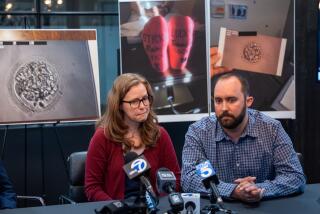Attorney Sums Up Case Against IBM
- Share via
SANTA CLARA, Calif. — IBM Corp. kept sending some employees back to work in its San Jose electronics factory even though the company knew chemicals used there were making them sick, an attorney for two cancer-stricken former IBM workers told a jury Monday.
In closing arguments in a case that could threaten the high-tech industry’s reputation as clean and safe, attorney Richard Alexander said his clients suffered “systemic chemical poisoning” from solvents they used at the hard disk drive factory and that IBM concealed the cause of their sickness from them.
“IBM knew there was an injury, and IBM knew it was caused by chemicals on the job,” he told the jury of one man and 11 women.
The Armonk, N.Y.-based company won a key ruling Friday when Santa Clara County Superior Court Judge Robert Baines limited the damages the plaintiffs could receive if victorious. The judge said the jury could award actual damages -- including medical costs and lost wages and pain and suffering -- but not punitive damages.
At the same time, Baines refused an IBM request that he dismiss the case on the grounds that the plaintiffs didn’t prove their case.
The jury is expected to begin deliberations today or Wednesday, after IBM makes its closing arguments. IBM and the Semiconductor Industry Assn., a trade group, contend there is no evidence that people who work in chip or component plants are more likely to develop cancer than people in other industries.
The verdict could have enormous implications for IBM and for other high-tech manufacturers. Alida Hernandez and James Moore are the first of more than 200 plaintiffs to argue in court that exposure to trichloroethylene, sulfuric acid, benzene and other chemicals at IBM’s hard disk drive and chip-making factories gave them cancer and caused their children to be born with birth defects.
The next trial against Big Blue is set to get underway next month in New York.
In California, most workplace injuries claims are covered under workers’ compensation laws. To pursue a civil lawsuit, an employee has to claim that his employer knew he was getting sick at work and didn’t tell him.
In the IBM case, Hernandez and Moore must show not only that there was “systemic chemical poisoning” but that IBM knew its employees were being harmed, deliberately withheld that information and kept sending them back to work.
IBM has strenuously denied those claims.
Hernandez, 73, has said she was often splashed with acetone, xylene and other chemicals used to coat and clean surfaces at IBM’s San Jose plant, where she worked for more than a dozen years. She was diagnosed with breast cancer in 1993 and had a mastectomy.
Alexander told the jury Monday that IBM’s medical team found abnormal liver function -- a symptom of chemical exposure -- in many of their examinations of Hernandez but didn’t tell her for years. In the meantime, she remained in contact with the chemicals.
Moore, 62, was diagnosed with non-Hodgkin’s lymphoma after working in the same plant for more than 20 years. He complained of headaches, blurred vision, blackouts and severe nasal congestion.
Alexander argued that IBM failed to tell Moore that profuse nasal discharges could be a symptom of systemic poisoning from exposure to solvents.
“No one’s telling Jim Moore anything about what happened, what the cause was, how the workplace was responsible for that condition,” Alexander told the jury. “The IBM medical department concealed from employees that they were sick from chemical exposure.”
Earlier in the trial, Audrey Crouch, a former registered nurse at IBM, testified that 80% of workers visiting the first-aid station where she worked complained of congestion or nasal discharges. But the company’s unwritten policy, she said, was to dispense allergy medications and record the visit as not related to industrial work.
Crouch was undercut on cross-examination when she was shown correspondence in which IBM’s medical staff disclosed Hernandez’s history of exposure to chemicals to the worker’s outside specialist.
Judge Baines’ decision not to let Moore and Hernandez seek punitive damages is unlikely to deter the current crop of lawsuits facing IBM, said Stephen Sugarman, a professor of personal injury law at UC Berkeley’s Boalt Hall School of Law. Attorneys for other plaintiffs can shift to arguments for damages based on pain and suffering, which could also lead to big awards.
“The lawyers may pitch their arguments slightly differently,” he said. “Will it dampen their will? They’re pretty determined already.”
However, the damages decision could have a chilling effect on future cases.
“It’s possible that when a plaintiff’s potential upside is capped, that may turn people away,” Sugarman said. But punitive damages are invoked in fewer than 10% of personal injury cases, he said, so the effect probably will be slight.
*
Times staff writer Alex Pham contributed to this report.






